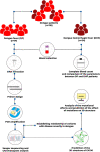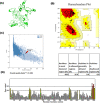The polymorphic landscape analysis of GATA1 exons uncovered the genetic variants associated with higher thrombocytopenia in dengue patients
- PMID: 35771876
- PMCID: PMC9278737
- DOI: 10.1371/journal.pntd.0010537
The polymorphic landscape analysis of GATA1 exons uncovered the genetic variants associated with higher thrombocytopenia in dengue patients
Abstract
The current study elucidated an association between gene variants and thrombocytopenia through the investigation of the exonic polymorphic landscape of hematopoietic transcription factor-GATA1 gene in dengue patients. A total of 115 unrelated dengue patients with dengue fever (DF) (N = 91) and dengue hemorrhagic fever (DHF) (N = 24) were included in the study. All dengue patients were confirmed through detection of NS1 antigen, IgM, and IgG antibodies against the dengue virus. Polymerase chain reaction using specific primers amplified the exonic regions of GATA1 while Sanger sequencing and chromatogram analyses facilitated the identification of variants. Variants G>A (at chX: 48792009) and C>A (at chX: 4879118) had higher frequency out of 13 variants identified (3 annotated and 10 newly recognized). Patients carrying either nonsynonymous or synonymous variants had significantly lower mean values of platelets compared to those harboring the reference nucleotides (NC_000023.11). Further analyses revealed that the change in amino acid residue leads to the altered three-dimensional structure followed by interaction with neighboring residues. Increased stability of the protein due to substitution of serine by asparagine (S129N at chX: 48792009) may cause increased rigidity followed by reduced structural flexibility which may ultimately disturb the dimerization (an important prerequisite for GATA1 to perform its biological activity) process of the GATA1 protein. This, in turn, may affect the function of GATA1 followed by impaired production of mature platelets which may be reflected by the lower platelet counts in individuals with such variation. In summary, we have identified new variants within the GATA1 gene which were found to be clinically relevant to the outcome of dengue patients and thus, have the potential as candidate biomarkers for the determination of severity and prognosis of thrombocytopenia caused by dengue virus. However, further validation of this study in a large number of dengue patients is warranted. Trial Registration: number SLCTR/2019/037.
Conflict of interest statement
The authors have declared that no competing interests exist.
Figures






References
Publication types
MeSH terms
Substances
Associated data
LinkOut - more resources
Full Text Sources
Medical
Miscellaneous

